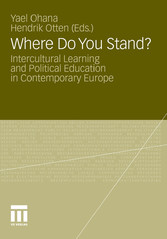
Where Do You Stand? - Intercultural Learning and Political Education in Contemporary Europe

von: Yael Ohana, Hendrik Otten
VS Verlag für Sozialwissenschaften (GWV), 2012
ISBN: 9783531943268
Sprache: Englisch
256 Seiten, Download: 2913 KB
Format: PDF, auch als Online-Lesen
Mehr zum Inhalt

Where Do You Stand? - Intercultural Learning and Political Education in Contemporary Europe
| Table of Contents | 5 | ||
| Foreword | 8 | ||
| To be an irreproachable member of a flock of sheep, first of all, one must be a sheep. | 10 | ||
| Introduction & Acknowledgements | 11 | ||
| Intercultural learning at an impasse? | 11 | ||
| The contributions to this book | 12 | ||
| Acknowledgements | 20 | ||
| Part I: Retrospectives | 22 | ||
| On the Political Didactics of Intercultural Learning – A Planning Concept for International Youth Work | 23 | ||
| Zur politischen Didaktik interkulturellen Lernens – Ein Planungskonzept für internationale Jugendarbeit (Band 1: Otten 1985) | 23 | ||
| Political Education: One Step Forward, Two Steps Back? | 26 | ||
| Acculturation of Young Foreigners in the Federal Republic of Germany: Problems and Concepts | 30 | ||
| Akkulturation junger Ausländer in der Bundesrepublik Deutschland – Probleme und Konzepte (Band 2: Treuheit and Otten 1986) | 30 | ||
| ‘25 Years Later’ or On the Sustainability of a Social Scientific Approach to Counselling | 33 | ||
| Cultural Identity and Intercultural Learning – On the Particular Problem of Ethnocentrism | 37 | ||
| Kulturelle Identität und interkulturelles Lernen – Zum besonderen Problem des Ethnozentrismus (Band 4: Sternecker 1992) | 37 | ||
| Back to the Future: A Few Words of Encouragement for Petra Sternecker’s ‘Cultural Identity and Intercultural Learning’ | 40 | ||
| Identity – Communication – Interaction | 43 | ||
| Identität – Kommunikation – Interaktion | 43 | ||
| Intercultural Dialogue Today? | 46 | ||
| Intercultural learning today | 47 | ||
| European Civil Society: An Open Societal Model for Young People in Europe? | 51 | ||
| Die europäische Bürgergesellschaft – geschlossene Gesellschaft oder offener Zukunftsenwurf für Jugendliche in Europa? | 51 | ||
| Eurospeak – Rhetoric, Politics and Young People in Europe | 54 | ||
| Different speeds, growing distance | 54 | ||
| The dilemma of being in or out | 55 | ||
| Everybody needs to learn – not just the young people | 56 | ||
| Citizenship and Multiculturalism: Rethinking Equality, Rights and Diversity in Contemporary Europe | 58 | ||
| Staatsbürgerschaft und Multikulturalismus: Neue Ansätze in Bezug auf Gleichstellung, Rechte und Vielfalt im Europa von Heute (Band 6: O’Cinneide 2004) | 58 | ||
| Rethinking Equality Again: Regression Masked as ‘Progress’ | 63 | ||
| Valorising Civic Engagement in Europe: ‘Political Education’ in a Balancing Act Between Aspirations and Realities | 67 | ||
| Die Förderung bürgerschaftlichen Engagements in Europa: politische Bildung im Spagat zwischen Wünschen und Wirklichkeiten (Band 6: Chisholm 2004) | 67 | ||
| ‘Political Education’ Between Aspirations and Realities: Another Decade Bites the Dust | 73 | ||
| Part II: Contemporary Reflections | 77 | ||
| Intercultural Education: Learning Empathy to Transgress54 | 78 | ||
| Introduction | 78 | ||
| Intercultural learning and critical pedagogy | 79 | ||
| Tolerance of ambiguity | 82 | ||
| Diatopic hermeneutics | 84 | ||
| Intercultural learning and social change | 86 | ||
| Intercultural dialogue | 89 | ||
| A new impetus for intercultural learning | 91 | ||
| Dealing with historical injustice | 91 | ||
| Breaking political silences | 92 | ||
| Intercultural Education from a Global Perspective: Caught Between Universalism and Contextualisation | 95 | ||
| Introduction | 95 | ||
| Intercultural education outside Europe | 98 | ||
| Intercultural education in indigenous contexts | 100 | ||
| The influence of black movements | 101 | ||
| The influences of popular movements and popular education | 102 | ||
| Politically correct ‘functional interculturalism’ | 103 | ||
| Interculturality with equality | 104 | ||
| Critical and de-colonial intercultural education | 105 | ||
| Learning from practice on other continents | 107 | ||
| Intercultural education as part of other value-based educations | 108 | ||
| Intercultural learning in emerging non-formal education practice | 110 | ||
| Reflections on intercultural education and social change outside Europe | 114 | ||
| Which direction should intercultural education in Europe and Latin America take? | 116 | ||
| A School of Democracy? Civil Society and Youth Participation in the Multicultural Europe | 121 | ||
| Expectations: what civil society has to offer young people | 122 | ||
| Young people in civil society: a reality check | 129 | ||
| A catalogue of obstacles | 137 | ||
| Conclusion: re-politicising civil society | 144 | ||
| After the ‘Failed Experiment’: Intercultural Learning in a Multicultural Crisis | 147 | ||
| Introduction: ‘no more apologies’ | 147 | ||
| The familiar problems of culture | 153 | ||
| The culture in interculturalism: fluid, and static | 155 | ||
| Culture, race, difference. | 157 | ||
| The new racism is, thus, a theory of what Barker calls | 160 | ||
| The failed experiment | 161 | ||
| Right populism | 163 | ||
| Conclusion: the politics of modesty in a culturally literate age | 165 | ||
| Part III: Perspectives | 167 | ||
| A New Intercultural Learning Concept for the European Youth Sector? | 168 | ||
| Introduction | 168 | ||
| For more rigour in intercultural education | 173 | ||
| To achieve this goal, we must | 184 | ||
| In partial answer to these questions he puts forward that | 185 | ||
| According to Habermas, the primary opportunity for this arises | 191 | ||
| On the purpose/s of intercultural learning | 193 | ||
| Mustapha Chérif puts it like this, | 194 | ||
| As Henry A. Giroux points out | 194 | ||
| As Hendrik Otten has observed, | 198 | ||
| Henry A. Giroux puts it this way, | 199 | ||
| On the contents of intercultural learning | 203 | ||
| On the methodology of and methods used in intercultural learning | 206 | ||
| As Laimonas Ragauskas, a European level youth work practitioner, has rightlyobserved | 207 | ||
| Rather as Titley points out | 214 | ||
| On the competencies of those facilitating intercultural learning | 215 | ||
| As Otten has put it in the latest revision of the ‘Ten Theses’, | 215 | ||
| We will deal with what we mean by each of these in some detail in the following: | 218 | ||
| Writing in this relation in 1963 (!), Theodore Adorno said | 219 | ||
| Conclusion | 222 | ||
| Henry A. Giroux sums up what is at stake as follows | 223 | ||
| Epilogue | 225 | ||
| London’s Burning | 226 | ||
| About the Contributors | 230 | ||
| About the Contributors | 231 | ||
| Glossary | 237 | ||
| Glossary of terms and concepts recurrently used | 238 | ||
| Bibliography | 242 | ||
| Bibliography | 243 |






